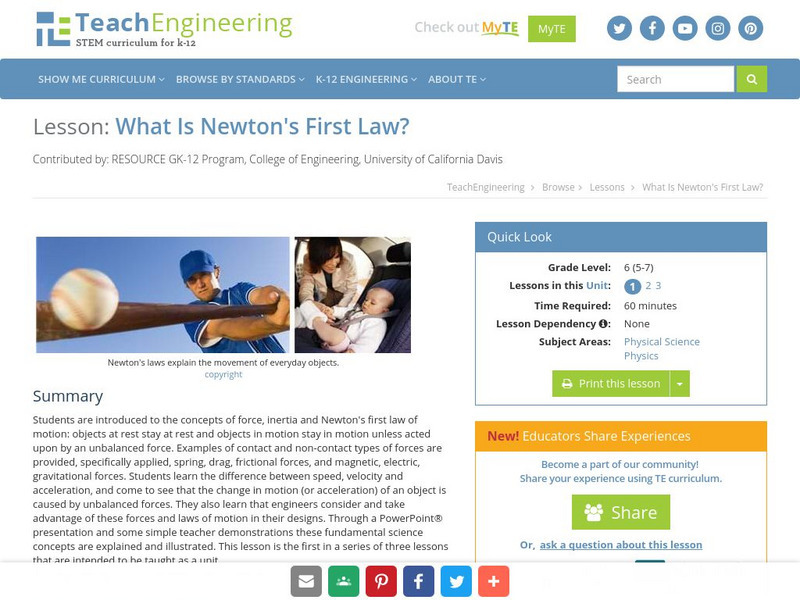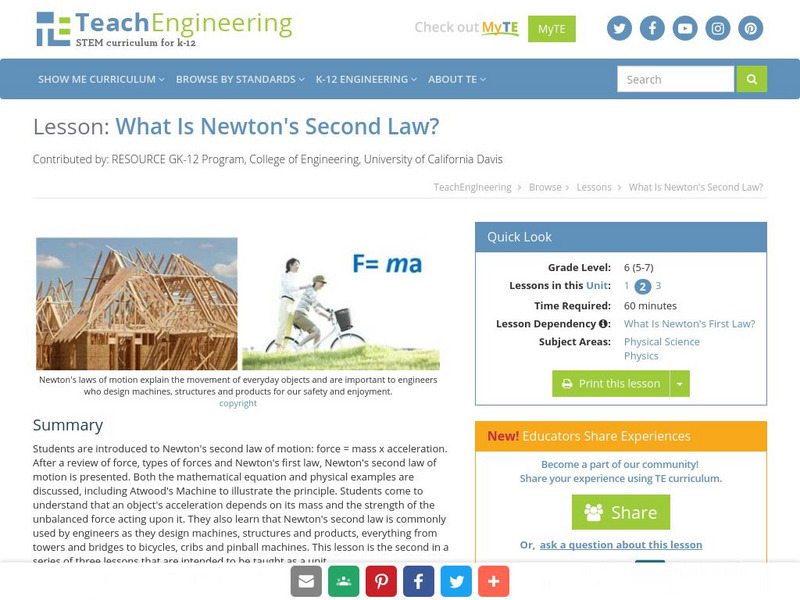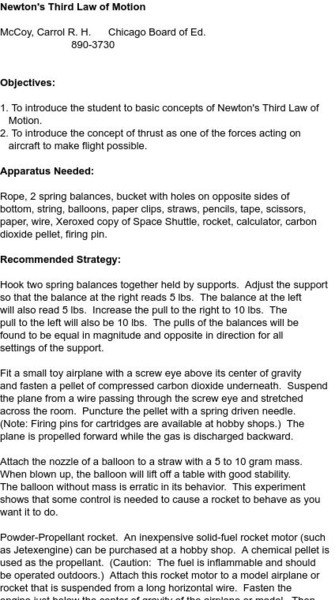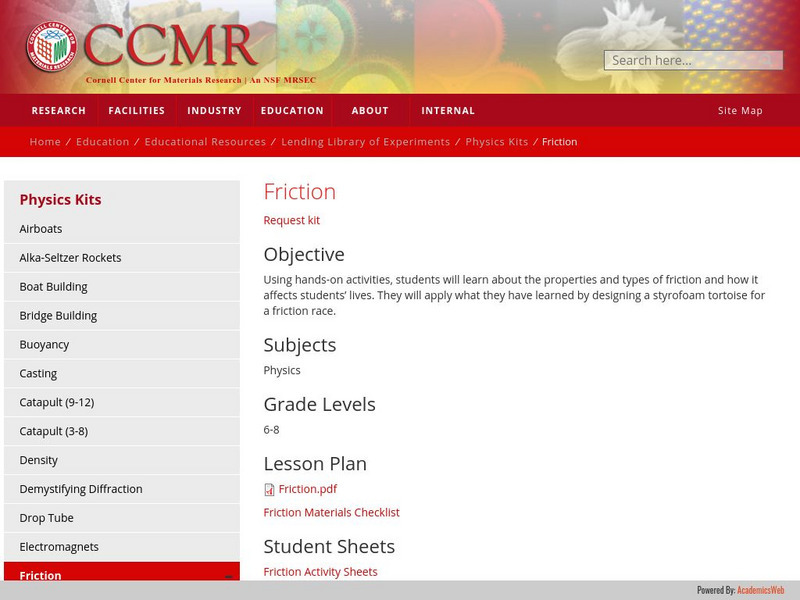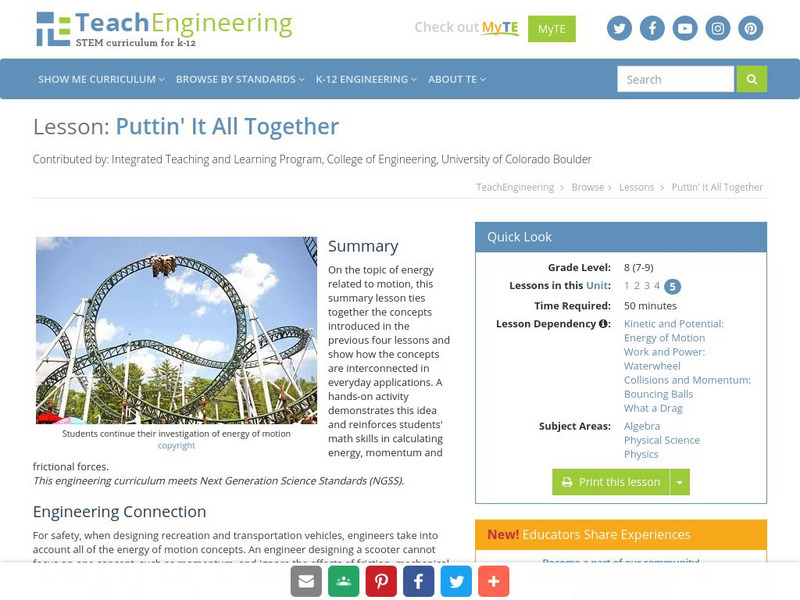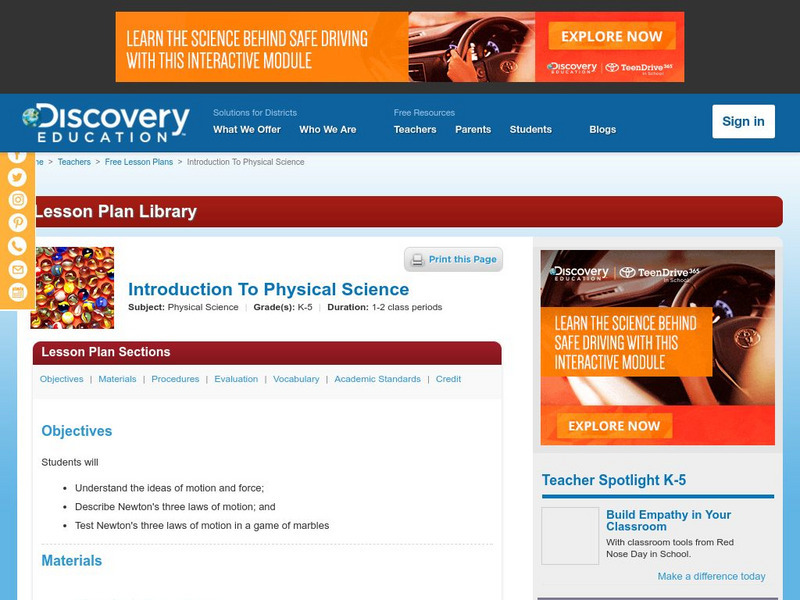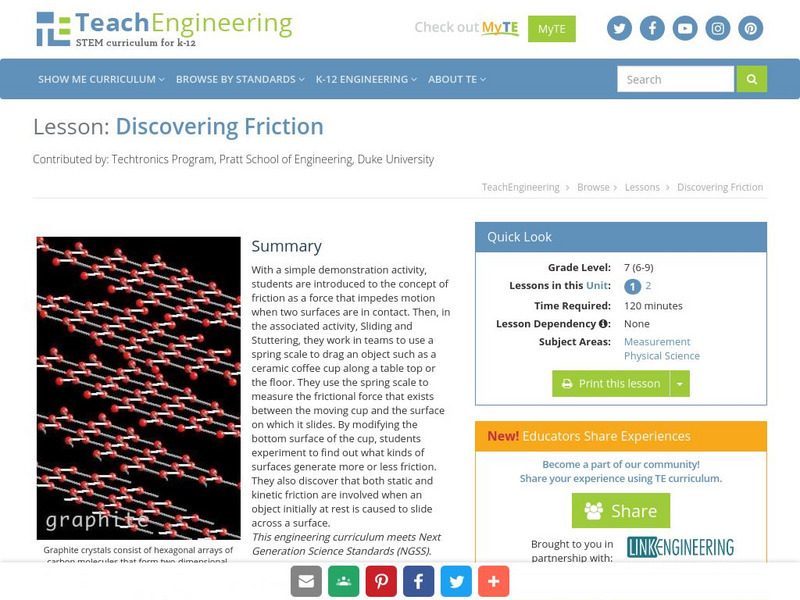TeachEngineering
Teach Engineering: What Is Newton's First Law?
Young scholars are introduced to the concepts of force, inertia, and Newton's first law of motion: objects at rest stay at rest and objects in motion stay in motion unless acted upon by an unbalanced force.This activity is the first in a...
TeachEngineering
Teach Engineering: What Is Newton's Third Law?
Students are introduced to Newton's third law of motion, and then learn that engineers apply Newton's third law and an understanding of reaction forces when designing a wide range of creations, from rockets and aircraft to door knobs,...
TeachEngineering
Teach Engineering: What Is Newton's Second Law?
After a review of force, types of forces, and Newton's first law, students are introduced to Newton's second law of motion: force = mass x acceleration.
Utah STEM Foundation
Utah Stem Action Center: Angry Birds Are Mad About Physics
Learn about catapults and Newton's laws of motion.
TeachEngineering
Teach Engineering: May the Force Be With You: Thrust
In this lesson, learners will study how propellers and jet turbines generate thrust. This lesson focuses on Isaac Newton's 3rd Law of Motion, which states that for every action there is an equal and opposite reaction.
Other
Ward's Science: Speedy Energy
This is an interactive inquiry where students will investigate the speed of an object and the energy it exerts as it crashes into other objects. Students will understand that the more speed an object has, the more energy it has in a...
Science and Mathematics Initiative for Learning Enhancement (SMILE)
Smile: Third Law of Motion
This Illinois Institute of Technology site provides a teacher lesson plan for an activity in which students use spring balances and carts to investigate the action-reaction relationship for any given force. Includes directions, materials...
Science and Mathematics Initiative for Learning Enhancement (SMILE)
Smile: Third Law of Motion
This Illinois Institute of Technology site is a lesson plan and lab that utilizes a toy rocket to investigate Newton's third law. Includes directions and practical applications.
Alabama Learning Exchange
Alex: Pendulums Swing Into Motion
This lesson will allow students in groups to describe the relationship between energy, work, and force through the use of pendulums. The results will be reported through a graphing activity as well as a paragraph written and printed on...
Alabama Learning Exchange
Alex: Experiencing Newton's Laws of Motion
This lesson will approach the study of Newton's 3 Laws of Motion using McGraw-Hill Science textbook Unit F. The students will be given an overview of the laws and vocabulary words to study. After introducing and explaining the concept of...
Cornell University
Cornell University: Cornell Center for Materials Research: Friction
A collection of experiments where students can learn about how friction works and affects the physical world. At the end, students design a tortoise to win by slowing it down using friction. Lesson includes explanation of the concept of...
TryEngineering
Try Engineering: Water Rocket Launch
The main focus of this lesson is learning about aerospace engineering and the principles of rocketry. To accomplish this, students will work in teams to design, build, and launch a rocket made out of a soda bottle, then present their...
TryEngineering
Try Engineering: Can You Canoe?
Teams of students learn about the engineering design process as they design, build, and test a model canoe made with everyday materials. Lesson focuses on how materials engineering has impacted the manufacturing of canoes over time.
TryEngineering
Try Engineering: Working With Watermills
Teams of students design, build, test, and evaluate a working watermill made from everyday materials. Lesson explores how watermills generate energy from water, while students gain an understanding of the structural engineering design...
TeachEngineering
Teach Engineering: Puttin' It All Together
On the topic of energy related to motion, this summary lesson is intended to tie together the concepts of work, power, collisions, momentum and drag. A hands-on activity demonstrates this idea and reinforces learners' math skills in...
Discovery Education
Discovery Education: Introduction to Physical Science
Introduce learners to the ideas of motion and force in this hands-on lesson plan.
TeachEngineering
Teach Engineering: Red Light, Green Light
Building upon their understanding of forces and Newton's laws of motion, students learn about the force of friction, specifically with respect to cars. They explore the friction between tires and the road to learn how it affects the...
TeachEngineering
Teach Engineering: Flocculants: The First Step to Cleaner Water!
Learners experience firsthand one of the most common water treatment types in the industry today, flocculants. They learn how the amount of suspended solids in water is measured using the basic properties of matter and light. In...
TeachEngineering
Teach Engineering: Imagine Life Without Friction
Students are introduced to the concept of inertia and its application to a world without the force of friction acting on moving objects. When an object is in motion, friction tends to be the force that acts on this object to slow it down...
TeachEngineering
Teach Engineering: Discovering Friction
With a simple demonstration activity, students are introduced to the concept of friction as a force that impedes motion when two surfaces are in contact. Then, in the Associated Activity (Sliding and Stuttering), they work in teams to...
Discovery Education
Discovery Education: Friction in Our Lives
Students observe objects in motion down a ramp to discover how the force of friction affects an object's motion. Includes the lesson plan, vocabulary list, and extensions for students.
TryEngineering
Try Engineering: Tinkering With Tops
Lesson explores the history, design, and motion of spinning tops. Student teams design and build their own tops that can spin for at least 10 seconds within a circle 30 centimeters in diameter.
Alabama Learning Exchange
Alex: To Push or Pull, That Is the Question?
In group students will learn to identify pushes and pulls. Students will learn how a push or pull will affect various items. This lesson plan was created as a result of the Girls Engaged in Math and Science University, GEMS-U Project.
TryEngineering
Try Engineering: A Question of Balance
Students work in teams to fill jars with a product that is uniform in weight or count. Lesson investigates how manufacturing engineers use weight scales and measurement to develop systems that can create consistent products.
